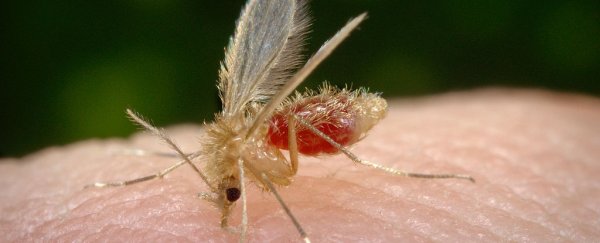As a flesh-eating disease starts migrating towards North America from the south, researchers have found a solution that looks promising for a vaccine.
The terrifying condition is called Leishmaniasis - it's caused by a parasite called Leishmania, which is spread around by sandfly bites. There are more than 20 species of this parasite, and the disease it causes can present in three devastating ways.
Cutaneous causes ulceration of the skin and lifelong scarring. Mucocutaneous destroys the mucous membranes of the nose, mouth and throat. And visceral, the most dangerous, attacks the liver and spleen - fatal if left untreated.
It's the second-deadliest parasite in the world and endemic across at least 98 countries in Asia, Africa, the Middle East, Central and South America and southern Europe. And, while it can be treated, prevention is a lot more difficult.
This is because the parasites use macrophages as hosts - the immune cells the body would normally use to destroy invaders. It essentially becomes camouflaged against the body's immune system.
An increasing number of cases have been found in North America, largely thanks to tourism, but outbreaks are also occurring closer and closer to the US border, potentially because of environmental modification and climate change.
There may be no vaccine yet, but researchers in the US and Brazil have developed a new experimental vaccine that looks promising for the future. Using a proprietary biological particle that mimics a virus, researchers have immunised mice in a laboratory setting.
"It can help the whole immune system to target this parasite," said researcher Alexandre Marques of Brazil's Federal University of Minas Gerais. "It won't allow this parasite to reproduce inside your cells or reach different organs to cause different symptoms."
Marques and his team collected samples of the parasite, then used spectroscopy for a careful analysis. They found details on its surface that make it vulnerable to a human immune reaction.
Leishmania covers itself in carbohydrates, which also cover all other cells in the body. Some of those carbohydrates do trigger a mild immune response. Not big enough to fight Leishmaniasis, but enough to give the team something to work with.
When this carbohydrate is attached to a fake virus particle, the body recognises the carbohydrate as a serious threat. It sends a strong immune response to attack it, which in the process destroys the Leishmania parasites.
They tested it by immunising groups of mice, then infecting them with the parasite. All mice treated with the vaccine showed undetectable or almost undetectable loads of the parasite, compared to the unvaccinated control group, every one of which was infected.
This demonstrates the viability of the potential vaccine - but there's a catch. More testing needs to be done, but humans and other primates are the only mammals that have an immune response to this particular carbohydrate. The mice had to be genetically altered to have a similar immune response.
The only options for more serious testing are humans and other primates, or genetically altered pigs, the research team said. But it's a matter of urgency, and has been for some time.
"People in developed countries in climates that were cooler will have to start caring about this, as global warming encourages this to spread to them," Marques said.
The research has been published in the journal ACS Central Science.
